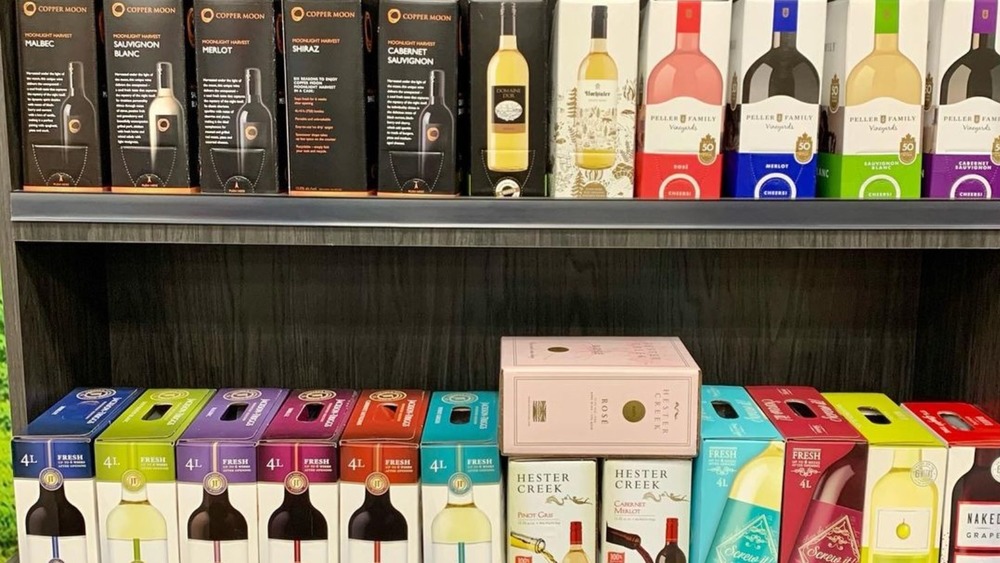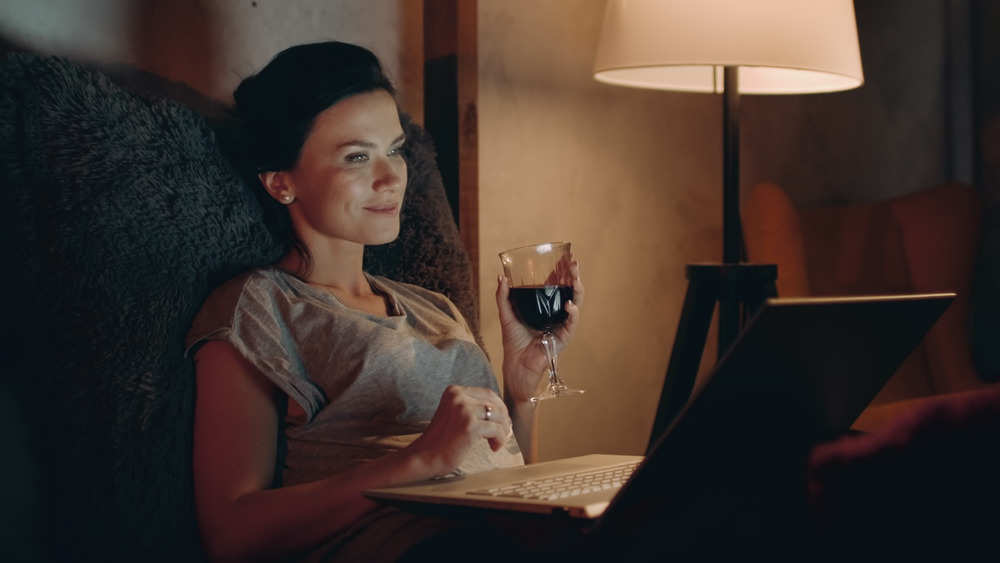The Untold Truth Of Boxed Wine
Most of us struggle to take boxed wine seriously, and we can't be blamed when we don't. After all, since the concept was invented by South Australian winemaker Thomas Angrove in 1965, the decades that followed saw cheap wine being poured into bladders and then stuffed into boxes by producers who wanted to cut packaging costs for inexpensive wines (via Sommelier Business).
That was all before winemakers woke up and realized that there was nothing wrong and everything right with the idea of pouring a premium wine into a box, as mass-market wine producers have been doing for a long time. "Once we secure quality fruit, the vinification process in our production facility – in terms of converting the grapes via fermentation into wine juice and aging appropriately in stainless steel or with oak – is exactly the same as it would be for any bottle counterpart," Kim Moore, who markets the premium boxed wine Black Box, tells Thrillist.
Boxed wine can keep for weeks
If you've had boxed wine before, you might know that wine in a box isn't really just wine in a box – it's actually wine in a lined bladder that's put in a box. The bladder can only be accessed through a resealable plastic tap, resulting in packaging that keeps wine fresh for longer (via Sommelier Business). Wine Folly estimates that the bladders allow boxed wine to keep for between six to eight weeks, possibly longer if you put it in the refrigerator since the bladders keep the wine from being damaged by light exposure (via Thrillist).
The ability of boxed wines to stay robust for longer is a winner for experts like Kentucky-based wine director Lindsey Ofcacek, who tells Refinery29, "While I also have plenty of beautiful unique wines in my cellar, those are for evenings with friends and thoughtful meals. When I get home from work or settle in to watch an episode of A Handmaids Tale after the kids go to bed, a glass of wine from the box is exactly what I am having. I typically only have one glass." For Ofcacek, the practical advantage is obvious: a bottle of wine might hold up for three days while boxed wine can last 10 times as long.
Boxed wines make a good, cost-efficient alternative to bottled wines
Then there is the cost factor. Boxed wines are cheaper than bottled wines, but these wines aren't cheaper because the stuff in them is of inferior quality; it's because boxes cost less to manufacture and less to transport, which – in theory at least – would allow winemakers to pass savings on to their consumers (via Thrillist).
The cost factor is another reason why you can blame the college you for your (possibly negative) impressions of boxed wine. Because they are cost-efficient, boxed wines shine in large gatherings, when there is a need for larger quantities of wine to go around. "Would you bring a $100 bottle of wine to a 40-person reunion? Probably not. Would you bring a few cases of $20 wine? Maybe, but then you do have to consider the clean-up, transportation, storage, serving, etc. Wine in a three-liter box might make sense for something like this. It is an easy 'self-serve' vessel. No corks are involved, and it is usually a wine that has mass appeal making it perfect for a crowd with minimal clean-up," certified sommelier Nora Hoefer tells Refinery29.
Boxed wines have a unique set of cons
All that being said, there are cons to boxed wines, too. They're very much a "live for the moment" beverage because the very factors that allow them to hang out in your pantry for such a long time don't allow them to age with grace. Boxed wine can last about two years before heads south. Because the idea of pouring wine into bladders and cardboard boxes still doesn't sit well with many premium producers, the selection of good boxed wines on offer is still fairly limited. Boxed wines also call for a bit of advanced planning because they need to be properly chilled in a fridge before they can be served (via Sommelier Business).
Thanks to the stigma attached to boxed wine, it may take a while for some of us to get around to the fact that boxed wine has grown up and matured like some of us like to think we have. "We say tasting is believing, and just getting people to try our wine gets them to peel back that stigma," Kim Moore tells The New York Times. And if admitting that you serve boxed wine at nice parties isn't something you do, take a cue from social media, where one user on Instagram declares, "It's no longer 'box wine'. The classy term is "carbordeaux.'"



